
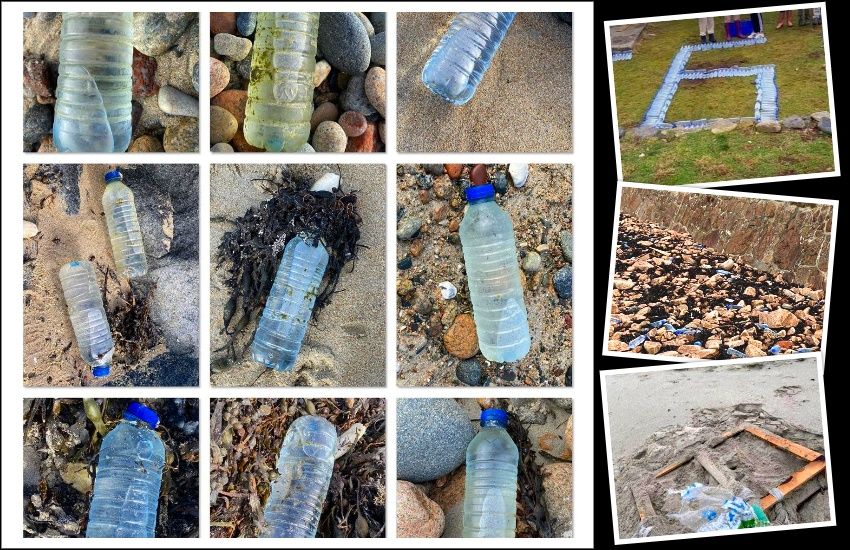

Around 5,000 mostly unopened water bottles washed up on Guernsey's shores last week - and now they seem to be making their way to Jersey.
By Sunday evening, Guernsey's largest group of beachcombers was aware of 4,987 bottles of 500ml mineral water collected from along the west coast. Hundreds more – possibly thousands – have also been removed from beaches by people independent of the group.
Parts of the coast most affected include Vazon, Richmond, L’Erée and Fort Grey. But the single greatest haul may have been removed from Lihou Island, where the St. Saviour’s Church youth group alone found 566.
Plastic bottles are also being found in France and the UK, while there have been isolated reports of bottles in Sark. Bottles are now beginning to wash up in Jersey too.
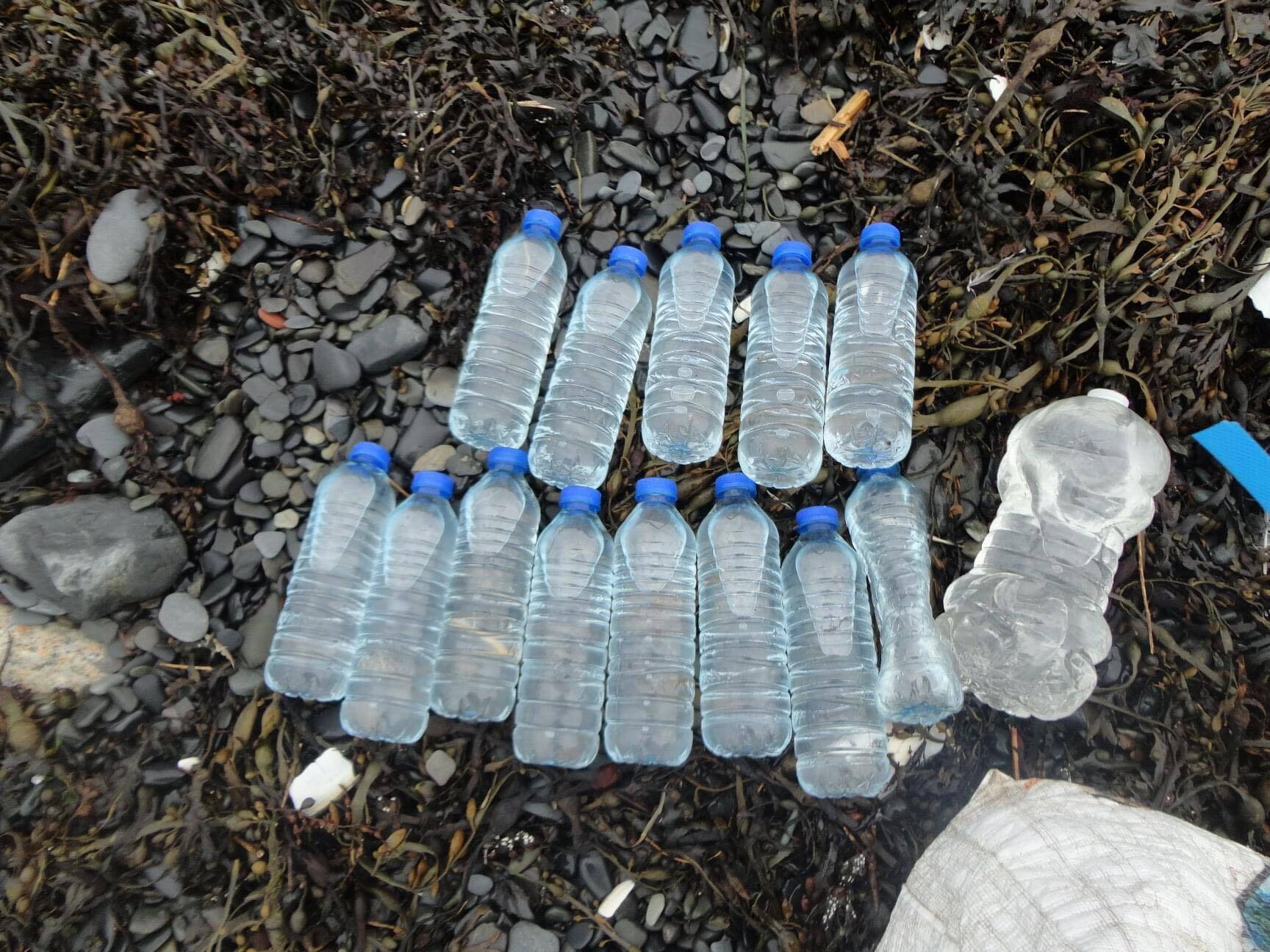
Pictured: Bottles found in St. Ouen in Jersey over the weekend.
Avid beach cleaner Tracy Vibert told Express she collected 16 yesterday from the La Saline area of St. Ouen's Bay - among the 12kg of rubbish that was removed from the area.
"They have all been brought home to be recycled," she said.
There remains uncertainty about how the bottles got onto beaches.

Pictured: A youth group from St. Saviour's Church in Guernsey made an impressive display of the number of plastic bottles they collected.
Beachcombers in Guernsey who are in touch with beachcombers in the UK say the first sightings of the bottles were early last month.
However, beachcombers in France report that containers full of plastic bottles were lost in a cargo spill in the Channel more recently.
This week, wooden pallets washed up at Vazon together with plastic packaging branded by Avant, a bottled water distributed by the British company Navson.
Wombler Wendy Le Prevost joined the effort over the weekend.
Speaking to Express on Sunday afternoon, she said islanders' response had been "amazing" and that "people have really pulled together and helped".
Pictured: An empty pallet believed to have been carrying bottles of Avant mineral water on a cargo ship which lost part of its load.
"The Guernsey grapevine soon gets word out and people love our beaches, marine life and wildlife. If picking up a few thousand plastic bottles is needed to save our beaches from plastic pollution, people step up and come to help," she said.
In a video posted earlier, she said: "We need to get as many of these water bottles off our beaches as we can whilst they are still full.
"Our beautiful Guernsey beaches are going to be littered with plastics, which is an environmental disaster. We are very close on the west coast to the Ramsar site [a wetland site designated to be of international importance].
"Anybody can get out, pick up a couple of bottles, empty the water and pop the empty bottles in your recycling at home."
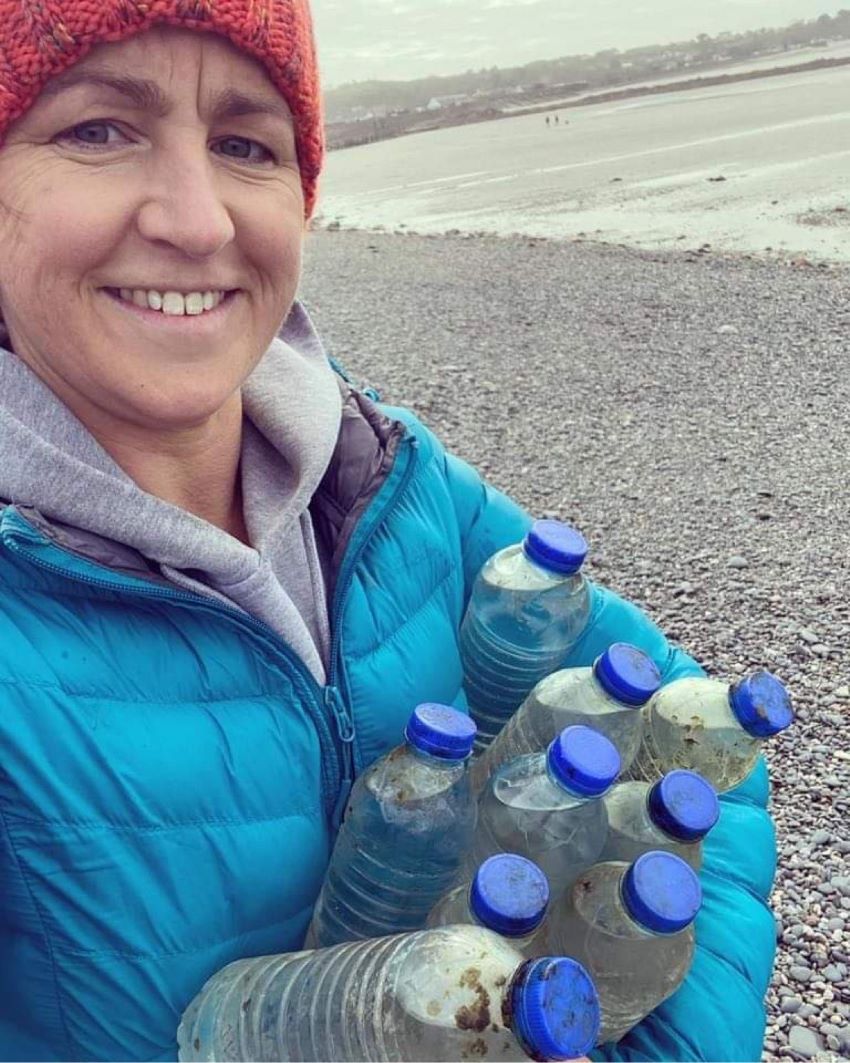
Pictured: On Saturday, Diana Kennedy collected 392 plastic bottles from Vazon and Le Crocq.
Sam Reoch helps run the beachcombers' Facebook group 'Found on the Beach in Guernsey'.
Express spoke to her on Sunday when she was inundated with people providing her with updates on how many bottles they had collected and from where. She said she first spotted the bottles on Friday when she was cleaning at Grandes Rocques.
"I updated my group and it went a bit crazy from there as more and more people were looking for them and finding them," said Ms Reoch.
"People are messaging me left, right and centre and it’s a full-time job updating [the numbers collected]. Hence I didn’t head out west myself today. Lots of people were telling me where they were heading and asking which beaches haven't been reported.
"Most of the bottles are sealed with no labels. Some have algae on the side.
"They started washing up in the Isles of Scilly on 4 or 5 January. They are also washing up in England, France and Jersey, but not in the quantities that we are getting on the west coast."
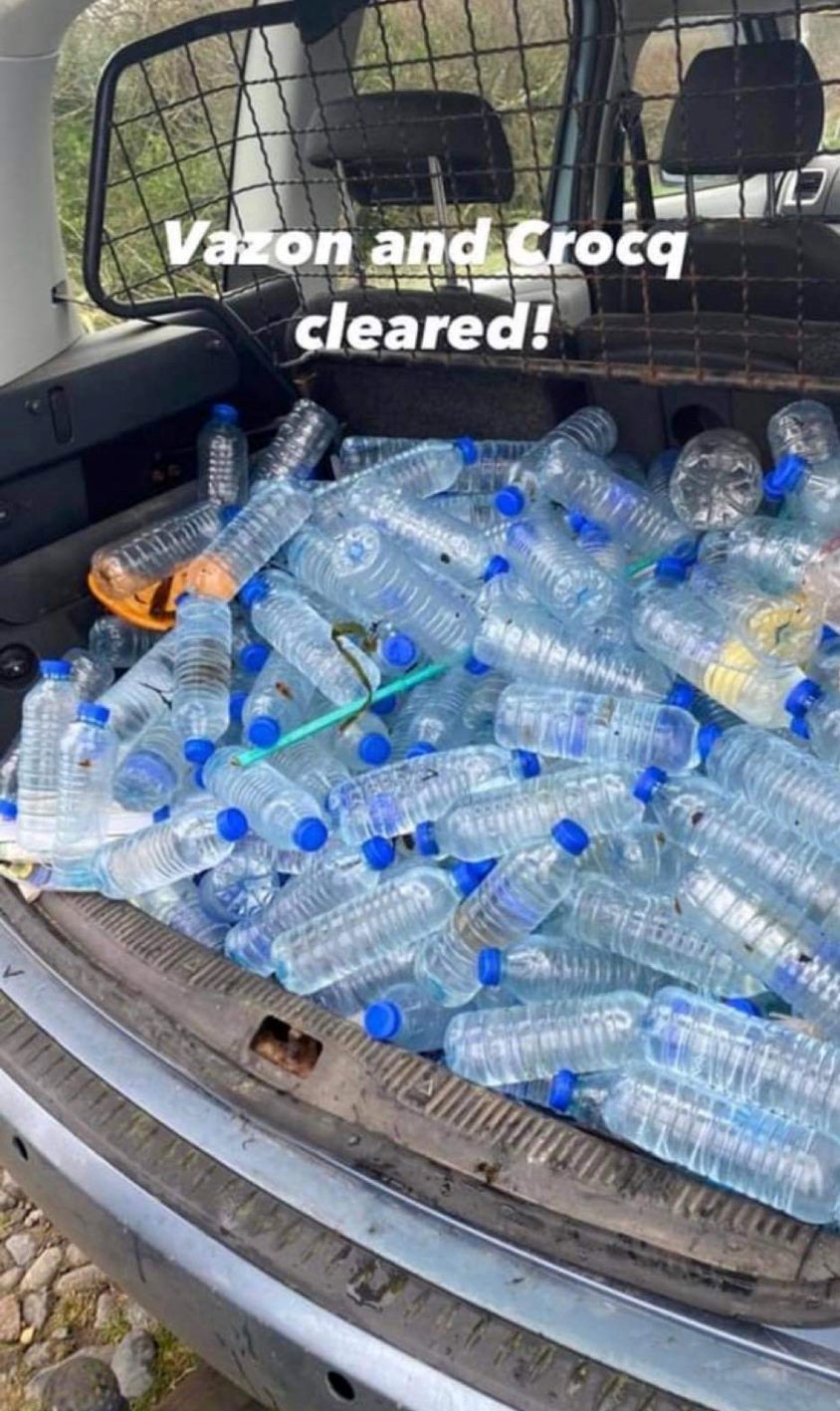
Pictured: Beachcombers were seen filling car boots with plastic bottles to get them off beaches and into recycling bags and bins.
Ms Reoch has messaged Avant to report the arrival of thousands of its bottles on Guernsey's shores.
"A pallet with the cellophane logos of Avant washed up at Vazon on Saturday - so we know they are from a pallet. What we don’t know is how many pallets," she said.
"One of our group members is a loader for the ferries and she says there are usually 1,000 to a pallet.
"Our numbers [of bottles collected] are only from the people in my group - so many more are going unaccounted for, left at the top of slipways in the bins, taken away for recycling, etc.
"I’m sure we’ll see more, but hopefully it will be slowing right down."
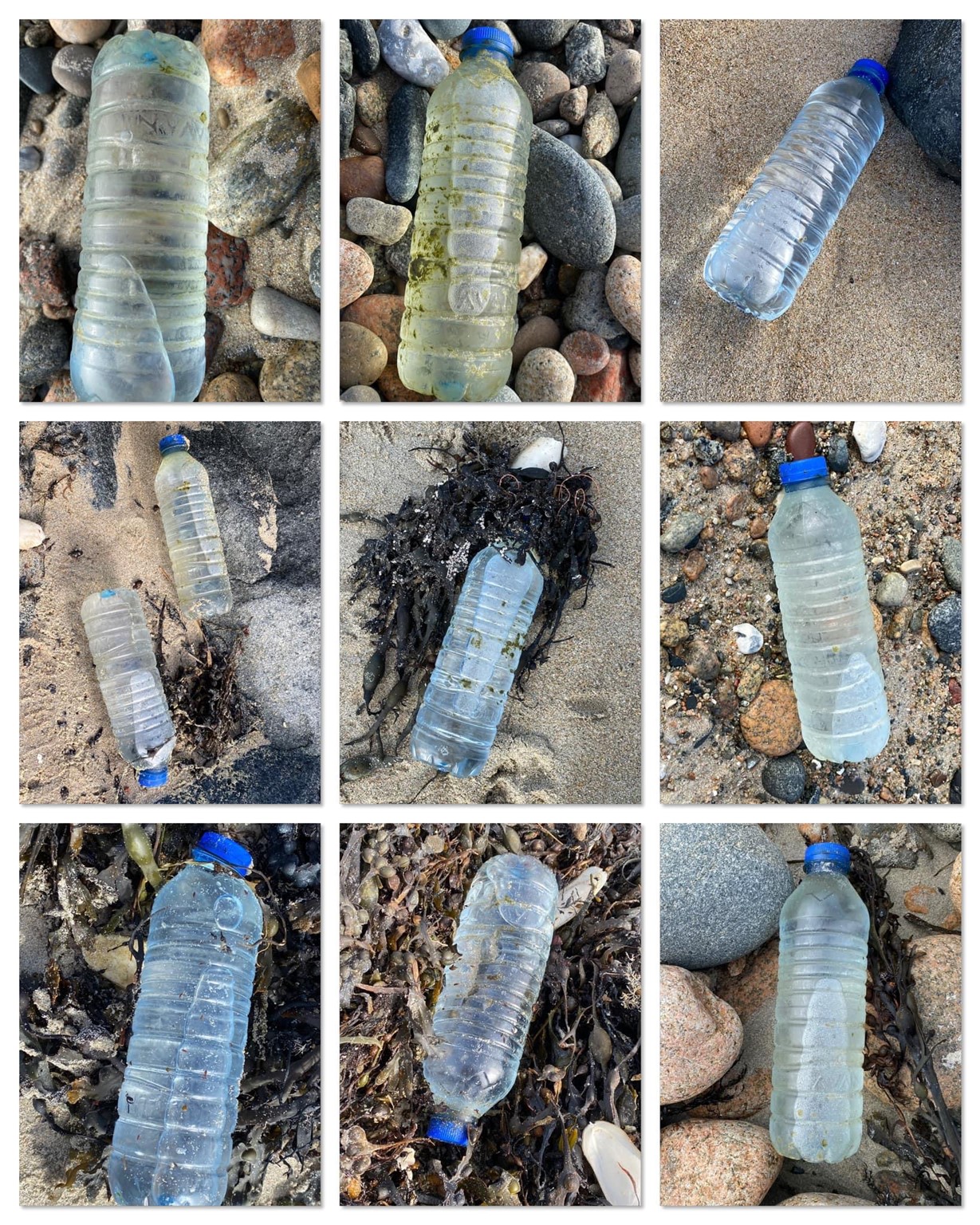
Pictured: These images were supplied by Sam Reoch of the beachcombers' Facebook group 'Found on the Beach in Guernsey'.
President of the island's Environment Committee Deputy Lindsay De Sausmarez said the spillage of thousands of plastic bottles served as a reminder of the challenges ahead to reduce the impact of environmentally unfriendly practices.
"Incidents like this are perhaps a good opportunity to reflect on what we can do as individuals to help prevent things like this happening in the first place," she said.
"I’m a bit baffled as to why single-use bottled water needs to be shipped at all to this part of the world, where we’re fortunate enough to have clean, safe drinking water freely available from every tap."
Pictured: Deputy Lindsay De Sausmarez took this image of blue recycling bags full of plastic bottles cleared from the beach at L’Erée.
She added: "The less we choose to buy, the less energy and fewer resources will be wasted in extracting, processing, manufacturing, transporting, refrigerating and finally disposing of this kind of single-use plastic.
"This means less expense for us as consumers, lower carbon emissions and ultimately less plastic to risk escaping into our environment to cause havoc."
Comments
Comments on this story express the views of the commentator only, not Bailiwick Publishing. We are unable to guarantee the accuracy of any of those comments.